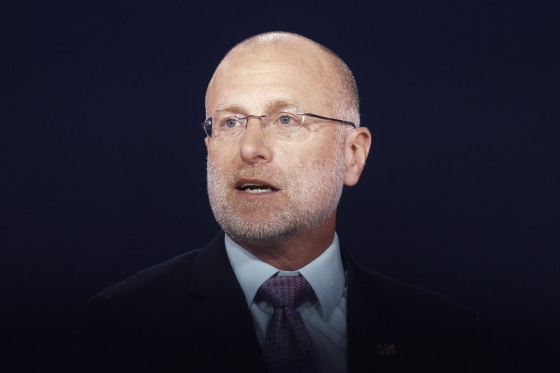A bipartisan group of former Federal Communications Commission leaders has petitioned the agency to repeal the policy the Trump administration invoked in discussions surrounding Jimmy Kimmel at ABC and in the investigation of "60 Minutes" at CBS.
The group — which includes five Republican and two Democratic former FCC commissioners, as well as several former senior staffers — calls for eliminating the agency’s long-standing “news distortion” policy.
The policy, according to the FCC’s website description, allows the agency to sanction broadcasters if “they have deliberately distorted a factual news report.”
The policy is not codified, but grew out of a standard used by the FCC to evaluate broadcasters. It was rarely invoked for decades until this year, when President Donald Trump’s pick to lead the FCC, Brendan Carr, cited it in several high-profile disputes with networks his agency regulates.
A representative for the FCC did not immediately respond to a request for comment.
According to the FCC, invoking the policy “must involve a significant event and not merely a minor or incidental aspect of the news report,” and that “expressions of opinion or errors stemming from mistakes are not actionable.” The petition was filed Thursday by the Protect Democracy, a legal and advocacy nonprofit “dedicated to defeating the authoritarian threat.”
Any interested person or group can petition a federal agency to create, adjust or repeal a rule, according to the Administrative Conference of the United States. But agencies are not required to use specific procedures when receiving or responding to petitions.
If the FCC chair declines to act — for instance, by directing the the agency to invite public comment — Gigi Sohn, an adviser to the petition, said that would give Protect Democracy a stronger basis for a lawsuit over the issue. Sohn was a longtime public advocate in telecommunications policy and counsel to Tom Wheeler, the chair of the FCC during President Barack Obama’s second term. She was nominated to serve as an FCC commissioner under President Joe Biden, but withdrew her candidacy after a wave of personal attacks.
Sohn said that Carr’s use of the policy illustrates the risk of government overreach.
“In the right hands, it could stop misinformation, disinformation, what have you. But the problem is, it’s never been used that way, and the FCC has other tools,” she said. “Right now, it’s being used as a cudgel. And this is not just about Chair Carr. This is about future chairs or commissioners who want to use this as a tool of censorship.”
The petition cites several incidents that it says illustrate the policy’s potential for abuse.
In February, the FCC invoked the policy in its investigations into CBS over allegations that the news program "60 Minutes" intentionally deceived its viewers with its editing of an interview with then-Vice President Kamala Harris. Before the investigation began, Trump sued CBS’ parent company, Paramount, for $20 billion over the interview. In July, the parties settled for $16 million.
Paramount at the time was pursuing an $8 billion merger with Skydance Media, which required FCC approval. The agency approved it later that month.
In a September interview with conservative influencer Benny Johnson, Carr said that local ABC affiliates could be in violation of the news distortion policy if they continued to air "Jimmy Kimmel Live" after the host’s remarks about the assassination of conservative activist Charlie Kirk.
In the episode, Kimmel criticized conservatives as “doing everything they can to score political points” from the killing.
Licensed broadcasters that aired Kimmel risked “the possibility of fines or license revocations from the FCC if [they] continue to run content that ends up being a pattern of news distortion,” Carr said.
ABC suspended Kimmel a few hours later. The network reinstated Kimmel the next week after substantial backlash, including from conservatives who criticized Carr. Sen. Ted Cruz, R-Texas, called Carr’s remarks “dangerous as hell“ and Sen. Rand Paul, R-Ky., said they were “absolutely inappropriate.” Carr later denied his comments were intended as a threat.
“What I spoke about last week is that when concerns are raised about news distortion, there’s an easy way for parties to address that and work that out,” Carr said at the Concordia media summit in September. “In the main, that takes place between local television stations that are licensed by the FCC and what we call national programmers like Disney. They work that out, and there doesn’t need to be any involvement of the FCC.”
But the former FCC chairs petitioning for the policy reversal say they took the comments as a threat.
“Wielding the news distortion policy, the FCC has already opened or threatened to open investigations against private broadcasters due to disagreements with editorial decisions or statements made in a comedic monologue,” the petition said. “Because the FCC has no legitimate interest in correcting or punishing what it considers to be slanted news coverage, the news distortion policy lacks a meaningful function.”
U.S. law, rooted in the First Amendment, generally prohibits the FCC from engaging in government censorship of speech.
The FCC’s jurisdiction is limited to broadcast organizations such as network television and radio stations, and cannot police cable news, newspapers or online-only news outlets. The agency didn’t immediately respond to a request for comment.
The petition says it is not designed to overturn the “hoax” rule, which bans broadcasters from deliberately presenting wholly false information about a crime or catastrophe without a disclaimer that it’s fiction.
The signatories of the petition include: Thomas Wheeler, a Democratic chair appointed by Obama; Rachelle Chong, a Republican commissioner appointed by President Bill Clinton; Alfred Sikes, a Republican chair appointed by President George H.W. Bush; Republican Andrew Barrett and Democrat Ervin Duggan, both commissioners also appointed by the senior Bush; Mark Fowler, a Republican chair appointed by President Ronald Reagan; and Dennis Patrick, a Republican commissioner also appointed by Reagan.

